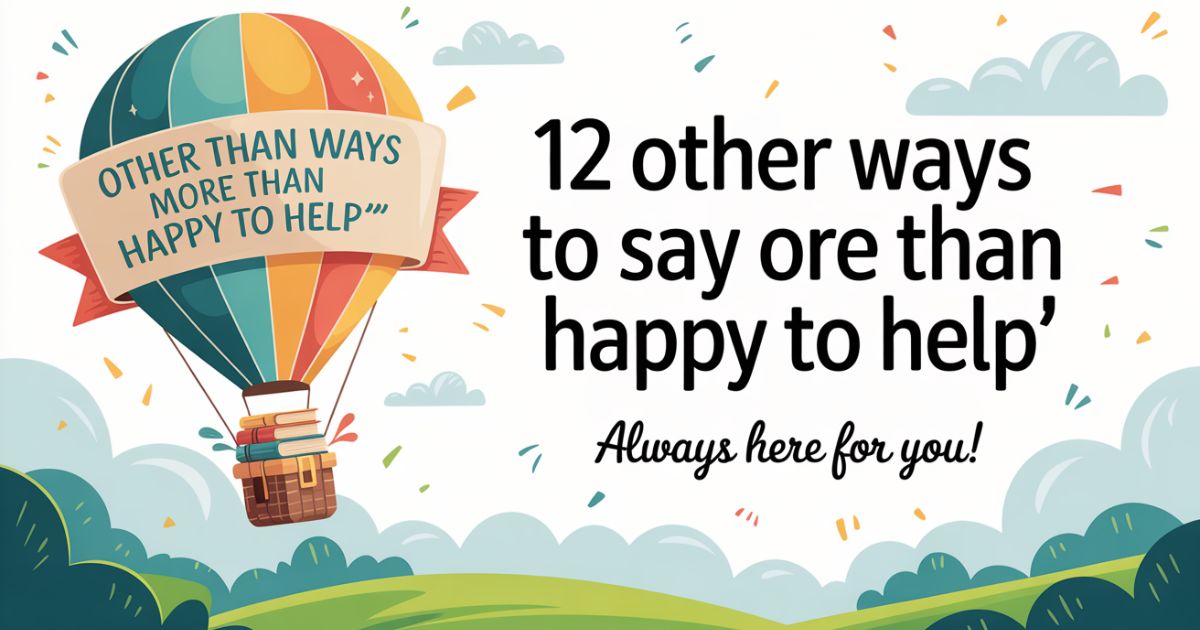Have you ever typed out “More than happy to help!” in an email and paused for a moment, wondering if it still felt genuine? It’s a lovely phrase warm, cheerful, accommodating but like any well-worn expression, it can lose its spark over time. In both personal and professional settings, the words we choose matter not just for clarity, but for emotional impact.
The way we say “I’ve got your back” or “You can count on me” changes depending on context, tone, and even the industry we’re in. And sometimes, switching it up breathes new life into your communication making it sound more authentic and aligned with who you are.
Let’s explore 12 other ways to say “more than happy to help,” each carrying its own emotional flavor, cultural nuance, and situational charm.
1. “Always glad to lend a hand.”
This version has a touch of old-school warmth. It’s the kind of thing a helpful neighbor might say, or a trusted coworker in a tight-knit team. It’s informal, slightly folksy, and works beautifully in creative or collaborative settings.
Best for: Casual emails, friendly teams, or when you want to come across as grounded and approachable.
Pro tip: HR professionals often recommend expressions like this in internal communications to maintain a culture of camaraderie.
2. “It’s my pleasure.”
Short, sweet, and polished. You’ll often hear this in hospitality or customer service industries. It radiates professionalism and confidence without feeling cold.
Best for: Corporate emails, customer service replies, and formal exchanges where professionalism is key.
Etiquette insight: Be careful not to overuse it repetition can make it sound like a script rather than sincere sentiment.
3. “Absolutely anytime.”
There’s something refreshingly modern and laid-back about this phrase. It’s like the verbal equivalent of a thumbs-up and a smile.
Best for: Colleagues, tech teams, startups, or when chatting on Slack.
Scenario: When a designer friend helped me fix a last-minute pitch deck, my message was, “Thanks again!” She replied, “Absolutely anytime.” It felt relaxed and real, with no fluff.
4. “Happy to support however I can.”
This phrase signals flexibility and empathy it shows you’re not just checking a box but genuinely invested in being helpful.
Best for: Academic settings, non-profits, or cross-functional teams where collaboration is complex.
Expert insight: According to communication coach Dr. Elaine Liu, “Supportive language like this encourages reciprocity and builds trust across cultures.”
5. “Don’t hesitate to reach out.”
Though it’s common, this one’s incredibly effective when used with warmth. Pair it with an open tone and it becomes more than a formality it becomes an invitation.
Best for: Follow-up emails, clients, or when ending a helpful thread.
Common misstep: Avoid using it passively (“Feel free to reach out”) unless you’re truly okay with being contacted again. Mixed messages erode trust.
6. “I’ve got you covered.”
Confident and slightly informal, this one says, “Relax, I’ve got this,” without being overbearing. It’s popular in fast-paced or creative environments.
Best for: Peer-level relationships, freelance collaborations, or leadership-to-team notes.
Real-world use: A producer friend told me this after I missed a project deadline. Her exact words? “No worries I’ve got you covered for tomorrow’s pitch.” I exhaled immediately.
7. “Let me know what you need.”
This phrase opens the door to collaboration while signaling attentiveness. It’s less about swooping in with a solution and more about co-creating one.
Best for: Complex projects, client onboarding, or team dynamics where needs evolve.
Linguistic note: Phrasing it as an invitation rather than a declaration makes it more empowering for the other person.
Bonus Round: 5 More Phrases with Flair
We promised 12, so here are five more to round out your repertoire each with its own unique tone:
- “You can count on me.” – Personal and dependable, great for team support.
- “Here if you need anything.” – Soft, open-ended, and emotionally intelligent.
- “Just say the word.” – Casual and confidence-boosting.
- “I’m all in.” – Enthusiastic and great for startup or collaborative cultures.
- “At your service.” – A bit formal, but timeless and courteous.
Conclusion
Language is personal, and every phrase we use is a tiny expression of our identity, mood, and intention. Whether you’re emailing a colleague, texting a friend, or replying to a client, the way you say “I’m here for you” should feel natural and true to your voice.
In different industries, you’ll see trends corporate types leaning toward polished phrases like “It’s my pleasure”, creatives embracing “Just say the word”, and educators often preferring “Happy to support however I can.” In multicultural or international settings, clarity and tone matter even more, so choosing words that reflect both kindness and clarity is key.


